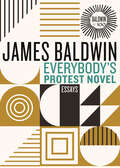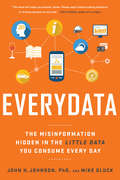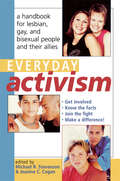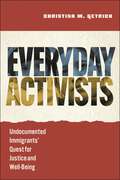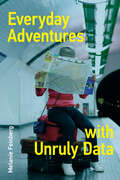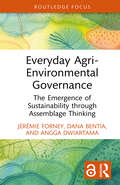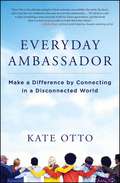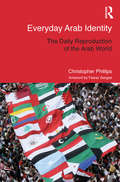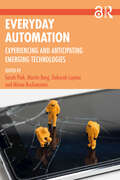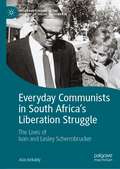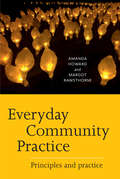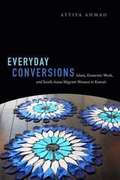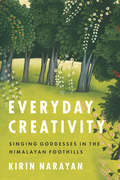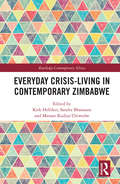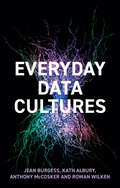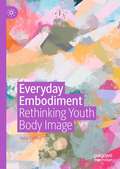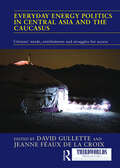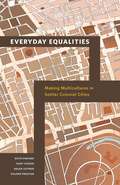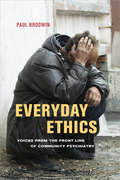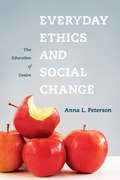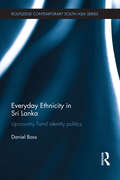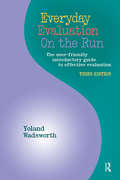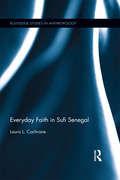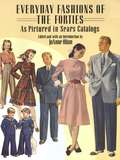- Table View
- List View
Everybody's Protest Novel: Essays
by James Baldwin"I am completely indebted to Jimmy Baldwin&’s prose. It liberated me as a writer."—Toni MorrisonThis collectible edition celebrates James Baldwin&’s 100th-year anniversary, probing the shortcomings of the American protest novel and the harmful representations of Black identity in film and fictionOriginally published in Notes of a Native Son, the essays "Autobiographical Notes," "Everybody's Protest Novel," "Many Thousands Gone," and "Carmen Jones: The Dark is Light Enough," showcase Baldwin's incisive voice as a social and literary critic.&“Autobiographical Notes&” outlines Baldwin&’s journey as a Black writer and his hesitant transition from fiction to nonfiction. In the following essays, Baldwin explores the Black experience through the lens of popular media, critiquing the ways in which Black characters—in Harriet Beecher Stowe&’s novel Uncle Tom&’s Cabin, Richard Wright&’s novel Native Son, and the 1950s film Carmen Jones—are reduced to digestible caricatures.Everybody&’s Protest Novel: Essays is the first of three special editions in the James Baldwin centennial anniversary series. Through this collection, Baldwin examines the facade of progress present in the novels of Black oppression. These essays showcase Baldwin&’s profound ability to reveal the truth of the Black experience, exposing the failure of the protest novel, and the state of racial reckoning at the dawn of the Civil Rights Movement.
Everydata: The Misinformation Hidden in the Little Data You Consume Every Day
by John H. Johnson Mike GluckWhile everyone is talking about "big data," the truth is that understanding the "little data" (stock reports, newspaper headlines, weather forecasts, etc.) is what will help you make smarter decisions at work, at home, and in every aspect of your life. The average person consumes approximately 30 gigabytes of data every single day, but has no idea how to interpret it correctly. Everydata explains, through the eyes of an expert economist and statistician, how to correctly interpret all of the small bytes of data we consume in a day. Readers will become effective, skeptical consumers of everyday data. * Everydata is filled with countless examples of people misinterpreting data - oftentimes with catastrophic results: * Millions of women avoid caffeine during pregnancy because they interpret correlation as causation * The initial launch of HealthCare.gov failed in part because key decision-makers couldn't observe all of the data * A baby food company was investigated by the Federal Trade Commission for cherry picking data * Attorneys faced a $1 billion jury verdict because of outlier data * The Space Shuttle Challenger exploded because the engineers were dealing with a limited sample set * Hedge fund companies claim they can make smarter predictions - but the market data says otherwise Each chapter of Everydata highlights one commonly misunderstood data concept, using both real-world and hypothetical examples from a wide range of topics, including business, politics, advertising, law, engineering, retail, parenting, and more. Readers will get the answer to the question--"Now what?"--along with concrete ways they can use this information to immediately start making smarter decisions, today and every day.
Everyday Activism: A Handbook for Lesbian, Gay, and Bisexual People and their Allies
by Michael R. Stevenson Jeanine C. CoganFrom same-sex marriages to hate-crime laws, gay, lesbian and bisexual people have fought an uphill battle to gain equal rights. Now a comprehensive new reference collects in one volume the strategies, hard data, and legal arguments that are central to the fight for equality in lesbian, gay and bisexual (LGB) life.Up-to-date and readable, Everyday Activism is the one essential book that provides the basic facts on the key questions faced by LGB citizens.
Everyday Activists: Undocumented Immigrants' Quest for Justice and Well-Being
by Christina M. GetrichStrategies of resistance by undocumented young adultsAbout 825,000 of the more than two million undocumented young adults in the United States benefited from the Deferred Action for Childhood Arrivals (DACA) program started by President Obama in 2012. Through DACA, these young adults are able to work legally in the United States and have been insulated from deportation. However, since President Trump’s attempted termination of the program in 2017, DACA recipients have endured a rollercoaster of legal battles that have left them in an unimaginable state of prolonged limbo.Amid this rapidly shifting political climate, many undocumented young adults have joined the large-scale, high-visibility social movement to fight for policy change and immigrant justice. Yet often overlooked are the thousands more DACA recipients nationwide who have never participated in immigration-related activism. As Christina M. Getrich argues, in less publicly visible ways, they are nonetheless fighting for immigrant well-being and justice in their everyday adult lives, and their more private forms of action should be considered political activism. Drawing from five years of rich ethnographic research with a diverse population of thirty DACA recipients living in the Washington, D.C., area, Everyday Activists portrays the alternative political engagement strategies they enact in their daily lives as they leverage their unique knowledge bases and skill sets and make a meaningful impact in their communities. The volume reveals how these young activists’ strategies are instructive for thinking creatively about how to show up in our everyday lives for immigrants and others who are systematically subjected to social exclusion.
Everyday Adventures with Unruly Data
by Melanie FeinbergPaired informal and scholarly essays show how everyday events reveal fundamental concepts of data, including its creation, aggregation, management, and use.Whether questioning numbers on a scale, laughing at a misspelling of one&’s name, or finding ourselves confused in a foreign supermarket, we are engaging with data. The only way to handle data responsibly, says Melanie Feinberg in this incisive work, is to take into account its human character. Though the data she discusses may seem familiar, close scrutiny shows it to be ambiguous, complicated, and uncertain: unruly. Drawing on the tools of information science, she uses everyday events such as deciding between Blender A and Blender B on Amazon to demonstrate a practical, critical, and generative mode of thinking about data: its creation, management, aggregation, and use. Each chapter pairs a self-contained main essay (an adventure) with a scholarly companion essay (the reflection). The adventure begins with an anecdote—visiting the library, running out of butter, cooking rice on a different stove. Feinberg argues that to understand the power and pitfalls of data science, we must attend to the data itself, not merely the algorithms that manipulate it. As she reflects on the implications of commonplace events, Feinberg explicates fundamental concepts of data that reveal the many tiny design decisions—which may not even seem like design at all—that shape how data comes to be. Through the themes of serendipity, objectivity, equivalence, interoperability, taxonomy, labels, and locality, she illuminates the surprisingly pervasive role of data in our daily thoughts and lives.
Everyday Agri-Environmental Governance: The Emergence of Sustainability through Assemblage Thinking (Routledge Focus on Environment and Sustainability)
by Jérémie Forney Dana Bentia Angga DwiartamaRevitalising the way the social sciences question agri-environmental governance, this book introduces "the everyday governance approach" as a means to improving the sustainability of agriculture and food systems.The "everyday" refers to localised practices, specific networks, and practical norms that emerge in a process of interaction, translation, and reinterpretation. The authors build this approach on assemblage thinking and theory, which focuses on the collective production of the social through complex sets of connections. For this reason, assemblage thinking becomes a particularly productive guide in exploring how everyday governance is co-produced in the interaction between numerous social processes involving a diversity of actors and instruments. The authors navigate between original and contrasting case studies from Switzerland, Indonesia, and the European Union in order to reorient attention to the transformative nature of governance, which they locate along four different dimensions of the everyday: (1) the interdependence of instruments within a wider governance assemblage; (2) the uncertainty and unpredictability of effects in agri-environmental governance; (3) the distributed nature of agency and its implication for power relations; (4) the importance of capacities in the transformation of agri-food systems. This book calls for a redesigning of agri-environmental governance that should move away from the setting of fix and precise objectives and solutions, and rather aim for a consolidation of sound foundations on which desirable futures can emerge.The book will be an essential read for students and scholars interested in sustainable agriculture and food systems, governance modes and approaches, and sustainability more broadly.
Everyday Ambassador: Make a Difference by Connecting in a Disconnected World
by Kate OttoIn Everyday Ambassador Kate Otto brings people together even as our digital networks pull us further apart.In a world of limitless technology, we are more connected than ever before but our hyper-connected lifestyles threaten our ability to know ourselves and interact with each other. By focusing on the four core values that allow us to become truly "connected" in tech-centric societies--empathy, patience, focus, and humility--Otto demonstrates that the power of technology is not in the tool, but in the intention of the person using it. Everyday Ambassador offers a unique solution to those who aspire to truly make a difference in the twenty-first century--revealing the secrets of how to unite people, even when technology keeps us at a distance from others--emotionally and physically. Otto helps us lift our heads up from our cell phones and tablets and take a look at the people standing right in front of us. In a time when good citizenship is the new currency of cool, Everyday Ambassador gives us the tactics to connect in our disconnected world.
Everyday Arab Identity: The Daily Reproduction of the Arab World (Routledge Studies in Middle Eastern Politics)
by Christopher PhillipsWhether through government propaganda or popular transnational satellite television channels, Arab citizens encounter a discourse that reinforces a sense of belonging to their own state and a broader Arab world on a daily basis. Looking through the lens of nationalism theory, this book examines how and why Arab identity continues to be reproduced in today’s Middle East, and how that Arab identity interacts with strengthening ties to religion and the state. Drawing on case studies of two ideologically different Arab regimes, Syria and Jordan, Christopher Phillips explores both the implications this everyday Arab identity will have on western policy towards the Middle East and its real life impact on international relations. Offering an original perspective on this topical issue, this book will be of interest to academics and practitioners working on the Arab world and political affairs, as well as students of International Relations, Political Science and the Middle East, notably Syria and Jordan, and policymakers in the region.
Everyday Automation: Experiencing and Anticipating Emerging Technologies
by Sarah Pink Deborah Lupton Martin Berg Minna RuckensteinThis Open Access book brings the experiences of automation as part of quotidian life into focus. It asks how, where and when automated technologies and systems are emerging in everyday life across different global regions? What are their likely impacts in the present and future? How do engineers, policy makers, industry stakeholders and designers envisage artificial intelligence (AI) and automated decision-making (ADM) as solutions to individual and societal problems? How do these future visions compare with the everyday realities, power relations and social inequalities in which AI and ADM are experienced? What do people know about automation and what are their experiences of engaging with ‘actually existing’ AI and ADM technologies? An international team of leading scholars bring together research developed across anthropology, sociology, media and communication studies and ethnology, which shows how by rehumanising automation, we can gain deeper understandings of its societal impacts. The Open Access version of this book, available at http://www.taylorfrancis.com, has been made available under a Creative Commons Attribution-Non Commercial-No Derivatives 4.0 license
Everyday Communists in South Africa’s Liberation Struggle: The Lives of Ivan and Lesley Schermbrucker (Palgrave Studies in the History of Social Movements)
by Alan KirkaldyThis book explores the role of social movements in the Southern African liberation struggle, through the lens of two ‘everyday communists’. Focusing on the Communist Party of South Africa (CPSA), the author explores the lives of Ivan and Lesley Schermbrucker, whose contribution to the party was more clandestine than that of leaders such as Bram Fischer and Joe Slovo. They represent how ‘ordinary’ people could play significant roles based on stances more rooted in common decency and morality than in Marxist theory. The book also sheds light on the interplay between transnational and national tendencies during the liberation movement, particularly between the 1940s and the 1960s. The Schermbruckers changed their views in response to the shifting national and international political landscape, the rise of Stalinism, and the flight of South African activists into exile from the 1960s. Both fluent in African languages, they were able to create relationships of trust with African members of the CPSA. Examining tensions and conflicts during the liberation struggle, this book provides fresh insights into ‘underground’ activism.
Everyday Community Practice: Principles and practice
by Amanda Howard Margot RawsthorneIncreasingly students and practitioners in human services are asked or seek to include community engagement, participation and capacity building in their work with groups. In this book expert authors Amanda Howard and Margot Rawsthorne provide guidance on the theory and practice of working with communities, from preliminary planning and scoping before direct work with the community begins, through to evaluation. They explore key issues including developing an understanding of community life, facilitating and supporting community action, understanding and acting on structural inequity, managing negotiation and conflict, and building productive networks. They draw extensively on their own work with communities and research to create a dialogue with the reader on the interaction of task and process in everyday community practice.Written in a friendly and accessible style and featuring the voices of community workers throughout, this is a vital guide for anyone seeking to encourage positive change in an important field of practice.'This is a splendid addition to the community work literature, offering wise and judicious guidance for those engaged knee-deep in community practice … it acknowledges that the increasing emphasis on individualised service options has too often led to the neglect of understanding the benefits of collective action within diverse and dynamic communities.' - Dr Winsome Roberts, Honorary Senior Fellow, Department of Social Work, University of Melbourne
Everyday Conversions: Islam, Domestic Work, and South Asian Migrant Women in Kuwait
by Attiya AhmadWhy are domestic workers converting to Islam in the Arabian Peninsula and Persian Gulf region? In Everyday Conversions Attiya Ahmad presents us with an original analysis of this phenomenon. Using extensive fieldwork conducted among South Asian migrant women in Kuwait, Ahmad argues domestic workers’ Muslim belonging emerges from their work in Kuwaiti households as they develop Islamic piety in relation—but not opposition—to their existing religious practices, family ties, and ethnic and national belonging. Their conversion is less a clean break from their preexisting lives than it is a refashioning in response to their everyday experiences. In examining the connections between migration, labor, gender, and Islam, Ahmad complicates conventional understandings of the dynamics of religious conversion and the feminization of transnational labor migration while proposing the concept of everyday conversion as a way to think more broadly about emergent forms of subjectivity, affinity, and belonging.
Everyday Creativity: Singing Goddesses in the Himalayan Foothills
by Philip V. Bohlman Kirin NarayanKirin Narayan's imagination was captured the very first time that, as a girl visiting the Himalayas, she heard Kangra women join their voices together in song. Returning as an anthropologist, she became fascinated by how they spoke of singing as a form of enrichment, bringing feelings of accomplishment, companionship, happiness, and even good health--all benefits of the "everyday creativity" she explores in this book. Part ethnography, part musical discovery, part poetry, part memoir, and part unforgettable portraits of creative individuals, this unique work brings this remote region in North India alive in sight and sound while celebrating the incredible powers of music in our lives. With rare and captivating eloquence, Narayan portrays Kangra songs about difficulties on the lives of goddesses and female saints as a path to well-being. Like the intricate geometries of mandalu patterns drawn in courtyards or the subtle balance of flavors in a meal, well-crafted songs offer a variety of deeply meaningful benefits: as a way of making something of value, as a means of establishing a community of shared pleasure and skill, as a path through hardships and limitations, and as an arena of renewed possibility. Everyday Creativity makes big the small world of Kangra song and opens up new ways of thinking about what creativity is to us and why we are so compelled to engage it.
Everyday Crisis-Living in Contemporary Zimbabwe (Routledge Contemporary Africa)
by Kirk Helliker Manase Kudzai Chiweshe Sandra BhatasaraThis book examines the everyday lives of ordinary Zimbabweans in the context of national crises in post-2000 Zimbabwe. Throughout the literature of Zimbabwean studies, a consideration of everyday lives has been limited to informal trading and rarely applied as an analytical framework, despite the importance of understanding crisis-living with reference to the specific character of national crises across the African continent. This edited volume is one of the first in its field to theorise everyday Zimbabwean lives within the context of crisis, with three central themes addressed: urban and rural lives; men, women and HIV; and along and beyond the border. Chapters incorporate topics from child marriage and sexual practices, to climate change and social accountability, encompassing a shift in focus from macro-structures to how farm labourers, students, child-brides and other ordinary people negotiate gender, class and social dynamics within a dominant order. The introductory chapter offers an innovative analytical framing for the empirical chapters which follow, each providing micro-studies based on original qualitative fieldwork by early-career Zimbabwean scholars. Everyday Crisis-Living in Contemporary Zimbabwe will appeal to students and scholars of sociology, anthropology and African Studies more broadly.
Everyday Data Cultures
by Jean Burgess Rowan Wilken Anthony McCosker Kath AlburyThe AI revolution can seem powerful and unstoppable, extracting data from every aspect of our lives and subjecting us to unprecedented surveillance and control. But at ground level, even the most advanced ‘smart’ technologies are not as all-powerful as either the tech companies or their critics would have us believe.From gig worker activism to wellness tracking with sex toys and TikTokers' manipulation of the algorithm, this book shows how ordinary people are negotiating the datafication of society. The book establishes a new theoretical framework for understanding everyday experiences of data and automation, and offers guidance on the ethical responsibilities we share as we learn to live together with data-driven machines.Everyday Data Cultures is essential reading for students and researchers in digital media and communication, as well as for anyone interested in the role of data and AI in society.
Everyday Eating: Food, Taste and Trends in Britain since the 1950s
by Alan WardeHow have eating habits changed in recent decades? What does it mean to eat well? This fascinating book examines continuity and change in food consumption and eating patterns since the 1950s. The culinary landscape of Britain is explored through discussion of commodification, globalisation and diversification enabling an understanding of both developing trends and enduring habits. The author’s research undertaken over 40 years offers fresh insights into such practices as everyday meals, shopping, cooking and dining out and how these are shaped by demographic, social and cultural processes. The book provides a comprehensive and engaging analysis of eating in Britain today and of the many controversies about how this has changed.
Everyday Embodiment: Rethinking Youth Body Image
by Julia CoffeyThis book offers an innovative conceptual and methodological approach to one of the most significant health and wellbeing challenges for contemporary youth: body image. The social and cultural dimensions shaping body ideals and young people’s body image concerns have not been adequately explored in the current landscape of social media and youth body cultures. The author provides a sociological reframing of body image, foregrounding the social and cultural dimensions which are critical in shaping young people’s everyday bodily experiences. Chapters explore the significance of ‘gender’ and ‘wellbeing’ norms and the ways that circumstances of hardship and inequality are significant in mediating body concerns. In this, the book complicates simplistic understandings of body image, instead showing the complex processes by which body concerns are formed through the circumstances of embodied experience. The book advocates for the non-individual dimensions of body concerns—the social and cultural conditions of young people’s lives—to be foregrounded in strategies aimed at addressing this complex youth wellbeing issue. This text will be of interest to scholars in gender studies, youth studies, and feminist sociology.
Everyday Energy Politics in Central Asia and the Caucasus: Citizens’ Needs, Entitlements and Struggles for Access (ISSN)
by David Gullette and Jeanne Féaux de la CroixThe perception of Central Asia and its place in the world has come to be shaped by its large oil and gas reserves. Literature on energy in the region has thus largely focused on related geopolitical issues and national policies. However, little is known about citizens’ needs within this broader context of commodities that connect the energy networks of China, Russia and the West. This multidisciplinary special issue brings together anthropologists, economists, geographers and political scientists to examine the role of all forms of energy (here: oil, gas, hydropower and solar power) and their products (especially electricity) in people’s daily lives throughout Central Asia and the Caucasus. The papers in this issue ask how energy is understood as an everyday resource, as a necessity and a source of opportunity, a challenge or even as an indicator of exclusionary practices. We enquire into the role and views of energy sector workers, rural consumers and urban communities, and their experiences of energy companies’ and national policies. We further examine the legacy of Soviet and more recent domestic energy policies, the environmental impact of energy use as well as the political impact of citizens’ energy grievances.This book was published as a special issue of Central Asian Survey.
Everyday Equalities: Making Multicultures in Settler Colonial Cities
by Valerie Preston Kurt Iveson Ruth Fincher Helga LeitnerA timely new look at coexisting without assimilating in multicultural cities If city life is a &“being together of strangers,&” what forms of being together should we strive for in cities with ethnic and racial diversity? Everyday Equalities seeks evidence of progressive political alternatives to racialized inequality that are emerging from everyday encounters in Los Angeles, Melbourne, Sydney, and Toronto—settler colonial cities that, established through efforts to dispossess and eliminate indigenous societies, have been destinations for waves of immigrants from across the globe ever since. Everyday Equalities finds such alternatives being developed as people encounter one another in the process of making a home, earning a living, moving around the city, and forming collective actions or communities. Here four leading scholars in critical urban geography come together to deliver a powerful and cohesive message about the meaning of equality in contemporary cities. Drawing on both theoretical reflection and urban ethnographic research, they offer the formulation &“being together in difference as equals&” as a normative frame to reimagine the meaning and pursuit of equality in today&’s urban multicultures. As the examples in Everyday Equalities indicate, much emotional labor, combined with a willingness to learn from each other, negotiate across differences, and agitate for change goes into constructing environments that foster being together in difference as equals. Importantly, the authors argue, a commitment to equality is not only a hope for a future city but also a way of being together in the present.
Everyday Ethics
by Paul BrodwinThis book explores the moral lives of mental health clinicians serving the most marginalized individuals in the US healthcare system. Drawing on years of fieldwork in a community psychiatry outreach team, Brodwin traces the ethical dilemmas and everyday struggles of front line providers. On the street, in staff room debates, or in private confessions, these psychiatrists and social workers confront ongoing challenges to their self-image as competent and compassionate advocates. At times they openly question the coercion and forced-dependency built into the current system of care. At other times they justify their use of extreme power in the face of loud opposition from clients. This in-depth study exposes the fault lines in today's community psychiatry. It shows how people working deep inside the system struggle to maintain their ideals and manage a chronic sense of futility. Their commentaries about the obligatory and the forbidden also suggest ways to bridge formal bioethics and the realities of mental health practice. The experiences of these clinicians pose a single overarching question: how should we bear responsibility for the most vulnerable among us?
Everyday Ethics and Social Change: The Education of Desire
by Anna L. PetersonAmericans increasingly cite moral values as a factor in how they vote, but when we define morality simply in terms of a voter's position on gay marriage and abortion, we lose sight of the ethical decisions that guide our everyday lives. In our encounters with friends, family members, nature, and nonhuman creatures, we practice a nonutilitarian morality that makes sacrifice a rational and reasonable choice. Recognizing these everyday ethics, Anna L. Peterson argues, helps us move past the seemingly irreconcilable conflicts of culture and refocus on issues that affect real social change. Peterson begins by divining a "second language" for personal and political values, a vocabulary derived from the loving and mutually beneficial relationships of daily life. Even if our interactions with others are fleeting and fragmentary, they provide a viable alternative to the contractual and atomistic attitudes of mainstream culture. Everyday ethics point toward a more just, humane, and sustainable society, and to acknowledge moments of grace in our daily encounters is to realize a different way of relating to people and nonhuman nature - an alternative ethic to cynicism and rank consumerism. In redefining the parameters of morality, Peterson enables us to make fundamental problems such as the distribution of wealth, the use of public land and natural resources, labor and employment policy, and the character of political institutions the preferred focus of debate and action.
Everyday Ethnicity in Sri Lanka: Up-country Tamil Identity Politics (Routledge Contemporary South Asia Series)
by Daniel BassFocusing on notions of diaspora, identity and agency, this book examines ethnicity in war-torn Sri Lanka. It highlights the historical development and negotiation of a new identification of Up-country Tamil amidst Sri Lanka’s violent ethnic politics. Over the past thirty years, Up-country (Indian) Tamils generally have tried to secure their vision of living within a multi-ethnic Sri Lanka, not within Tamil Eelam, the separatist dream that ended with the civil war in 2009. Exploring Sri Lanka within the deep history of colonial-era South Asian plantation diasporas, the book argues Up-country Tamils form a "diaspora next-door" to their ancestral homeland. It moves beyond simplistic Sinhala-Tamil binaries and shows how Sri Lanka’s ethnic troubles actually have more in common with similar battles that diasporic Indians have faced in Fiji and Trinidad than with Hindu-Muslim communalism in neighbouring India, Pakistan and Bangladesh. Shedding new light on issues of agency, citizenship, displacement and re-placement within the formation of diasporic communities and identities, this book demonstrates the ways that culture workers, including politicians, trade union leaders, academics and NGO workers, have facilitated the development of a new identity as Up-country Tamil. It is of interest to academics working in the fields of modern South Asia, diaspora, violence, post-conflict nations, religion and ethnicity.
Everyday Evaluation on the Run: The User-friendly Introductory Guide To Effective Evaluation
by Yoland WadsworthEvaluating programs has become a fixture in the human service sector. In many cases, program staff are asked to conduct the evaluation without any training on how to properly do it. This widely used introduction to evaluation is intended for non-specialists who need to do evaluation as part of a busy workload. The book offers a practical overview of the main approaches to evaluation, strategies for involving stakeholders, and the evaluation industry’s toolbox of models and techniques. The author emphasizes the core principles and concepts of evaluation, and provides extensive examples. This third edition reflects current thinking on values in organizations and the need to use evaluation to guide future practice. It is a handy reference for professionals and students in health, welfare, and community work, and in government and non-profit agencies.
Everyday Faith in Sufi Senegal (Routledge Studies in Anthropology)
by Laura L. CochraneEveryday Faith in Sufi Senegal explores the historical, religious, cultural and economic contexts of Islam in Senegal through the narrative first-hand accounts of people’s everyday lives. Drawing on rich ethnographic fieldwork conducted by the author over a period of seven years, the result is a critical look at Senegal’s religious diversity within Islamic beliefs and practices. Containing interviews from men and women in both rural and urban locations, this book is an important contribution to the literature on Islamic practices, providing a much-needed perspective from ordinary practitioners of the faith. It is essential reading for scholars of the anthropology of religion, Islamic studies, mysticism, African studies, and development studies.
Everyday Fashions of the Forties As Pictured in Sears Catalogs
by Joanne OlianFew publications illustrate so comprehensively what American men, women, and children wore in the 1940s than the Sears catalogs of those years, when the company's fashions typified the tastes of the American mainstream. This book is a compilation of 122 fully illustrated and captioned pages selected and reproduced from rare copies of Sears catalogs of the World War II era.Over 120 large-format pages have been carefully reprinted on high-quality glossy stock. They reveal in sharp detail the broad range of clothing fashions available during a period when wartime gasoline rationing made mail-order shopping reach new heights of popularity.Hundreds of accurately detailed drawings depict articles of clothing and personal accessories, including hats, overcoats, shoes, dresses, sportswear, undergarments, neckties, and more. Styles for children range from play clothes to "Sunday best." Men's clothing reflects the conservativism in male fashions during the period. Women's wear ranges from slacks, newly popular with women in the workforce, to dresses with plenty of "Oomph."Here is a richly revealing document that historians of costume and readers interested in fashion, social history, and Americana will find endlessly fascinating. JoAnne Olian, curator of the Costume Collection at the Museum of the City of New York, has written an introduction that appraises the fashions of the 1940s and the many ways in which they reflected the times.
